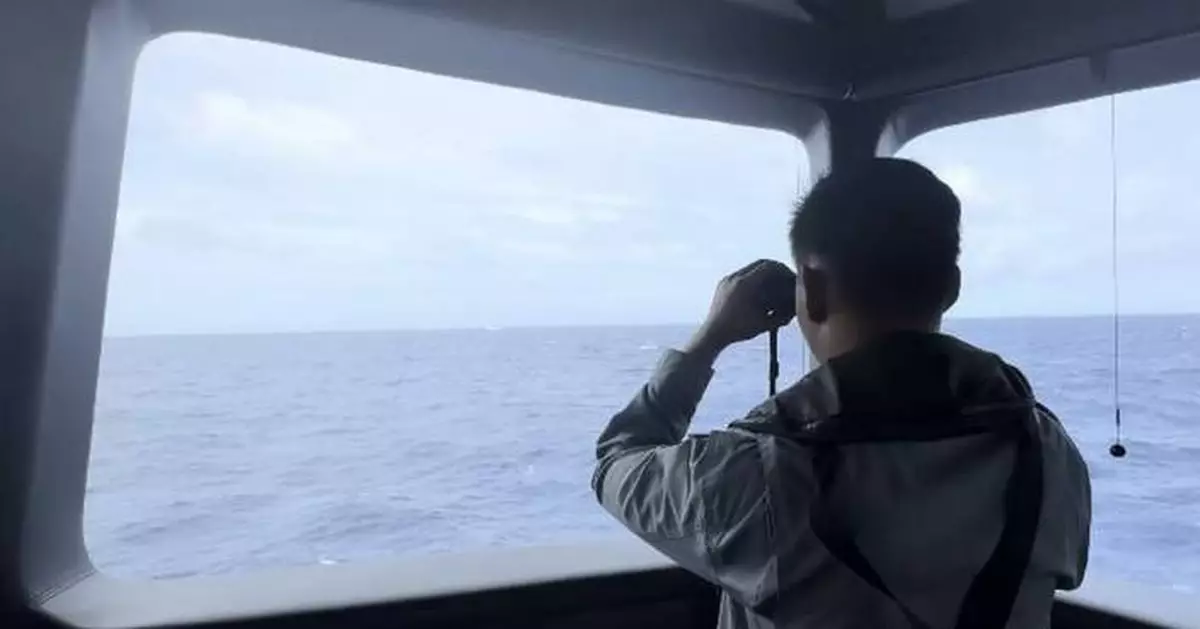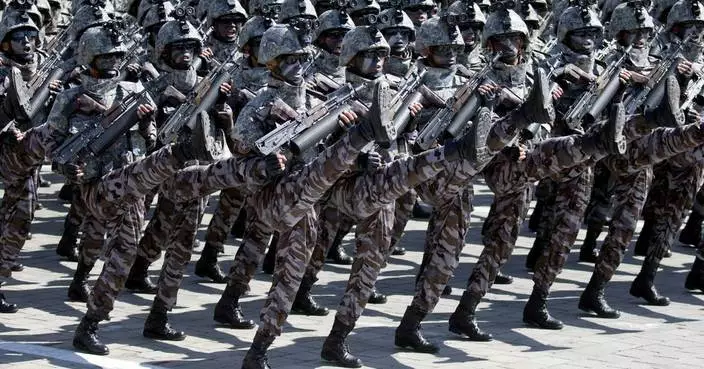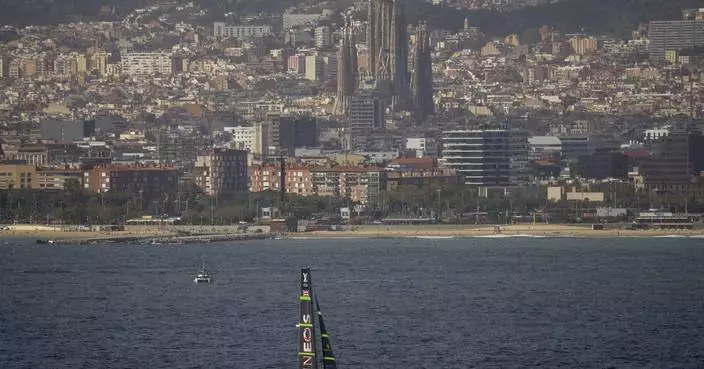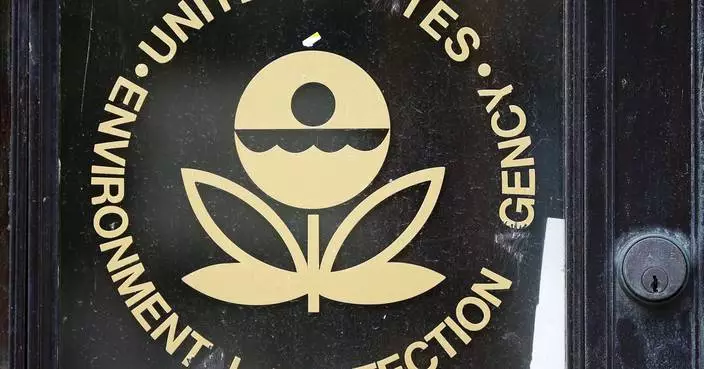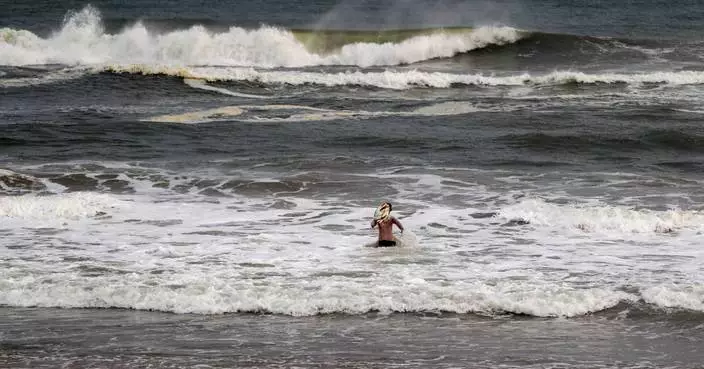JAKARTA, Indonesia (AP) — Indonesian patrol ships drove a Chinese coast guard vessel away from a survey vessel in a disputed area of the South China Sea for the second time in three days, Indonesian authorities said Thursday.
Indonesia's Maritime Security Agency said a Chinese ship approached the MV Geo Coral on Monday and Wednesday, interrupting a seismic data survey being conducted by the state energy company PT Pertamina in a part of the South China Sea claimed by both countries.
Asked about the Indonesian statement, Chinese Foreign Ministry spokesperson Lin Jian said the Coast Guard vessel had carried out routine patrols in waters under Chinese jurisdiction. “China is ready to enhance communication and consultation with Indonesia through diplomatic channels and properly handle maritime differences between the two countries,” he added.
China’s “nine-dash line,” which it uses to roughly demarcate its claim to most of the South China Sea, overlaps with a section of Indonesia’s exclusive economic zone that extends from the Natuna Islands.
Indonesia does not have a formal territorial dispute with China over the South China Sea but has become increasingly protective of its rights in the region, while Chinese ships have regularly entered the area Indonesia calls the North Natuna Sea, fueling tensions between the countries.
Indonesian authorities said the Chinese coast guard ship CCG 5402 was first detected near MV Geo Coral on Monday. An Indonesian patrol ship contacted the ship, whose crew insisted that the area was under China's jurisdiction before Indonesian coast guard and navy ships drove the Chinese ship away.
On Wednesday morning, the Chinese ship again approached the site of the seismic survey and was driven away, according to the Maritime Security Agency.
Earlier, the agency had said the second encounter took place Thursday morning.
A video distributed by the agency showed Indonesian coast guard officers speaking to their Chinese counterparts by radio and the China’s coast guard officials.
“This is China Coast Guard 5402. China has indisputable authority over Nansha islands and the adjacent waters,” says the the Chinese officer. “Chinese Coast Guard regular patrol in and above these domestic jurisdictional waters is unquestionable."
The Indonesian coast guard officer replies that the China’s vessel was in Indonesia’s Exclusive Economic Zone.
“Indonesia’s Maritime Security Agency will continue to conduct intensive patrols and monitoring in the waters of North Natuna to ensure that seismic survey activities run smoothly and maintain Indonesia’s sovereignty and sovereign rights,” said the statement.
Clashes at sea between China and its maritime rivals have become increasingly common in recent years, driving tensions especially with the Philippines and Vietnam. Chinese ships also regularly patrol off the island of Borneo and near James Shoal east of the Natuna islands, China’s southernmost territorial claim which Malaysia says belongs to it.
China’s construction and militarization of islands in the South China Sea have increased tensions as the U.S. and others have challenged China’s claims with the dispatch of ships and planes to assert the right to freedom of navigation.
A 2016 international arbitration ruling involving the Philippines invalidated most of China’s sweeping claims in the sea, but China has ignored the ruling and called it a sham.
China has in the past explained its presence in the waters on the basis of “traditional fishing rights.”
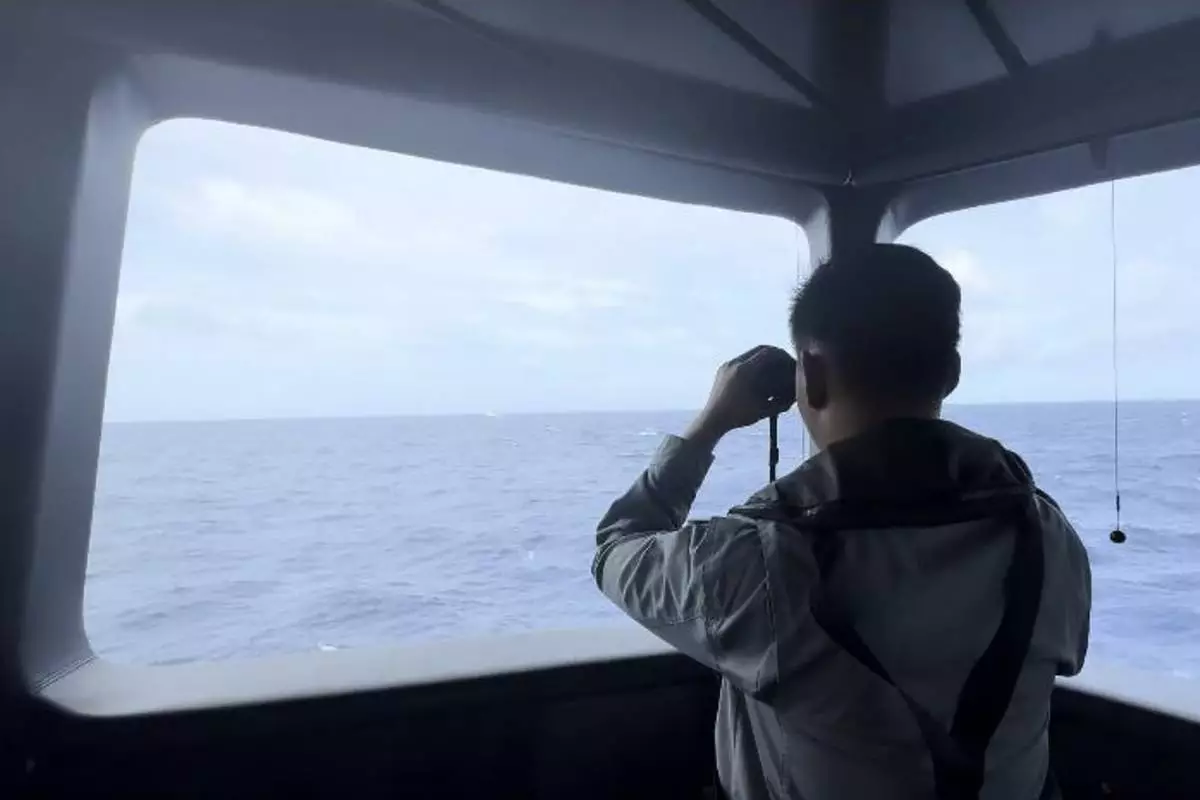
In this undated released by Indonesian Maritime Security Agency (BAKAMLA), a Maritime Security Agency uses a binocular to monitor the movement of a a Chinese coast guard vessel in the water of North Natuna Sea in the disputed area of the South China Sea, Indonesia, Thursday, Oct. 24, 2024. (BAKAMLA via AP)
SEOUL, South Korea (AP) — Trash carried by a North Korean balloon fell on the presidential compound in central Seoul on Thursday for the second time, raising concerns about the vulnerability of key South Korean sites.
The incident comes after the rival Koreas ramped up threats and rhetoric against each other over North Korea’s claims that South Korea flew drones over its capital Pyongyang to scatter propaganda leaflets this month.
No dangerous items were found in the rubbish that was dropped on the ground when one of the North Korean balloons burst over the South Korean presidential compound on Thursday morning, South Korea’s presidential security service said in a statement.
North Korea has sent thousands of balloons carrying bags of rubbish like plastic and paper waste into South Korea since late May in a resumption of a Cold War-style psychological campaign. The trash that fell on the South Korean presidential compound in July contained no hazardous materials as well.
It wasn’t immediately known whether South Korean President Yoon Suk Yeol was at the compound during the latest incident. Later Thursday, he met visiting Polish President Andrzej Duda at his office.
South Korean media reported that North Korean leaflets criticizing Yoon and his wife Kim Keon Hee were found on Thursday in Seoul's Yongsan district, where Yoon’s presidential office is located. Media published photos of some leaflets that described Kim as a latter-day Marie Antoinette, the queen who was beheaded in 1793 during the French Revolution.
The reports said it was the first time that North Korean propaganda leaflets have been found in South Korea since the North began its balloon campaign five months ago.
The South Korean presidential security service didn't confirm the reports. But South Korea’s Joint Chiefs of Staff later urged North Korea to stop flying “crude leaflets” slandering the South’s president, warning that Pyongyang will be entirely responsible for any consequences.
Experts say North Korea likely lacks the sophisticated technology needed to drop balloons on specific targets.
“Whether the balloons have GPS or not, it’s all about launching them in large numbers and hitting the right altitude based on wind direction and speed, so that they can ride those winds to travel,” Lee Choon Geun, an honorary research fellow at South Korea’s Science and Technology Policy Institute, said.
“While some media are saying the accuracy of the balloons has improved, that improved accuracy isn’t because they equipped them with some sort of guidance system, but rather because it’s the season when winds blow southward," Lee said.
North Korea has earlier accused South Korea of infiltrating drones to drop propaganda leaflets over Pyongyang three times this month and threatened military responses if it happened again. South Korea has refused to confirm whether it sent drones but warned that North Korea would face the end of its regime if the safety of South Korean citizens is threatened.
North Korea said its balloon activities were a tit-for-tat action against South Korean activists launching anti-Pyongyang leaflets via their own balloons. South Korea responded by restarting propaganda loudspeaker broadcasts at border areas, prompting North Korea to turn on their own frontline loudspeakers.
The Koreas' Cold War-style campaigns come as North Korean leader Kim Jong Un has increased the pace of his weapons tests and expanded military cooperation with Russia.
U.S. and South Korean officials said Wednesday that 3,000 North Korean troops have been deployed to Russia and are training at several locations. South Korean officials say North Korea eventually aims to send a total of 10,000 troops to Russia to support its war efforts in Ukraine.
South Korea is concerned that Russia may reward North Korea by giving it sophisticated technologies that could improve the North's nuclear and missile programs that target South Korea and the United States.
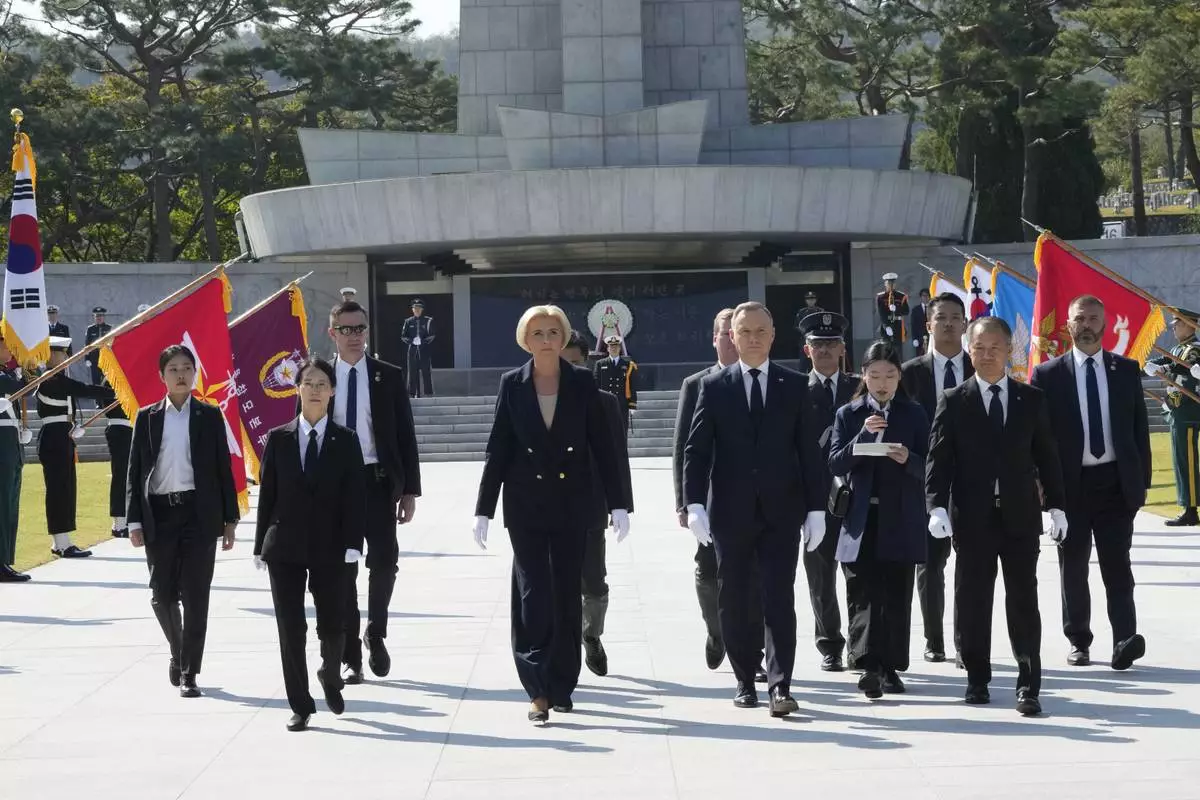
Polish President Andrzej Duda, center right, and his wife Agata Kornhauser-Duda, center left, visit the National Cemetery in Seoul, South Korea, Thursday, Oct. 24, 2024. (AP Photo/Ahn Young-joon)
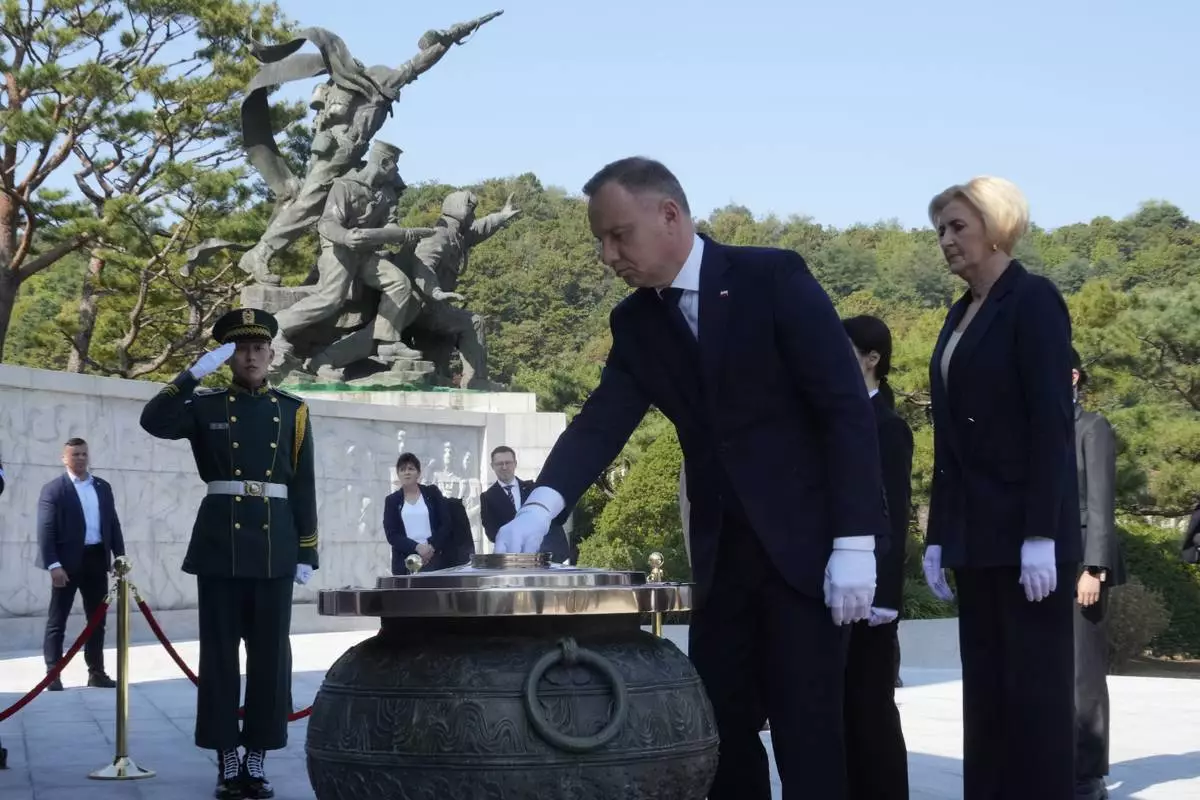
Polish President Andrzej Duda burns incense as his wife Agata Kornhauser-Duda stands at the National Cemetery in Seoul, South Korea, Thursday, Oct. 24, 2024. (AP Photo/Ahn Young-joon)
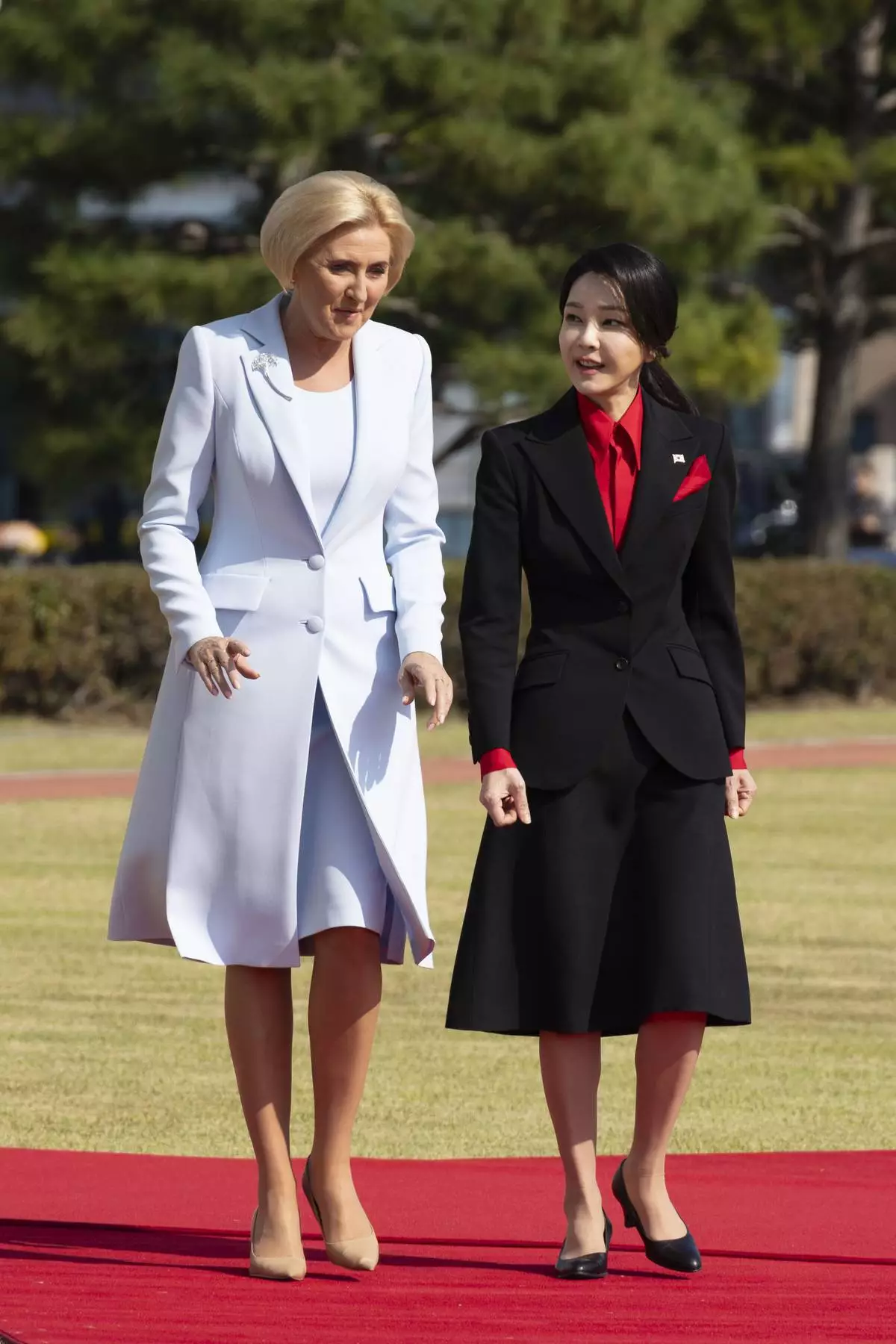
South Korean first lady Kim Keon-Hee, right, talks with Polish first lady Agata Kornhauser-Duda during a welcoming ceremony at the Presidential Office in Seoul, South Korea, Thursday, Oct. 24, 2024. (Jeon Heon-Kyun/Pool Photo via AP)
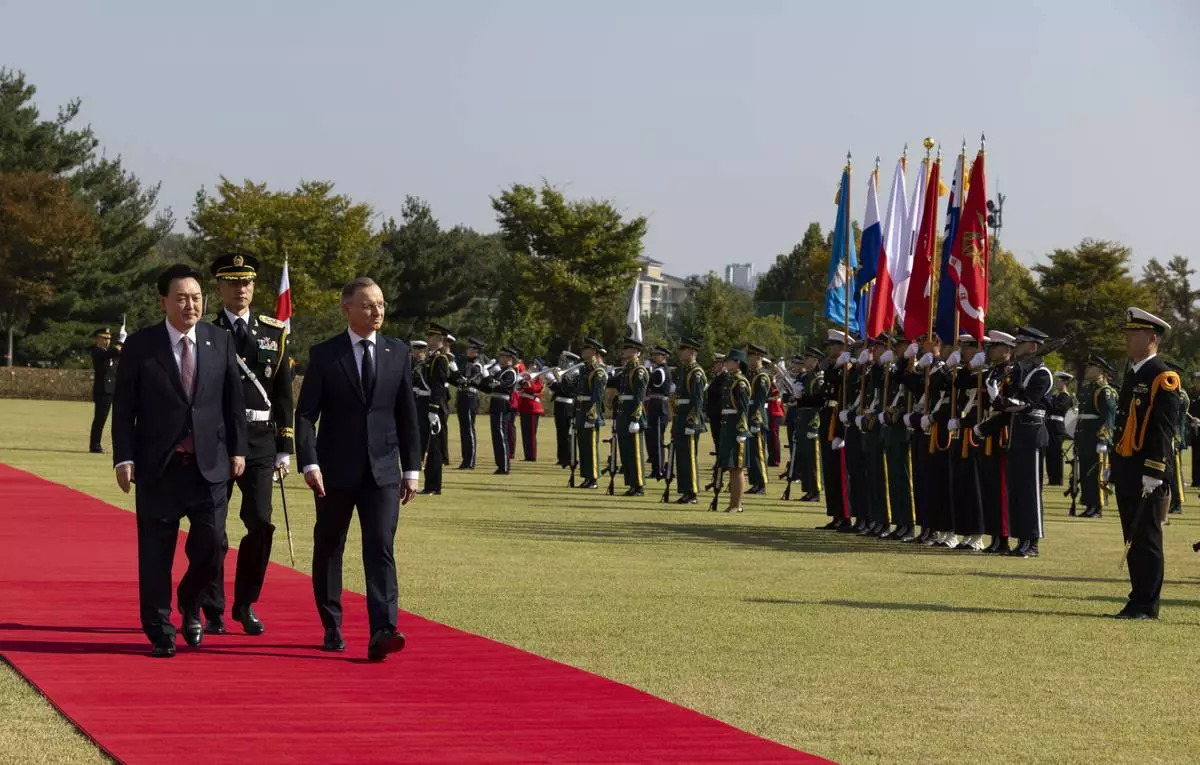
South Korea's President Yoon Suk Yeol, left, and Poland's President Andrzej Duda, third from left, walk with honor guards during a welcoming ceremony at the Presidential Office in Seoul, South Korea, Thursday, Oct. 24, 2024. (Jeon Heon-Kyun/Pool Photo via AP)
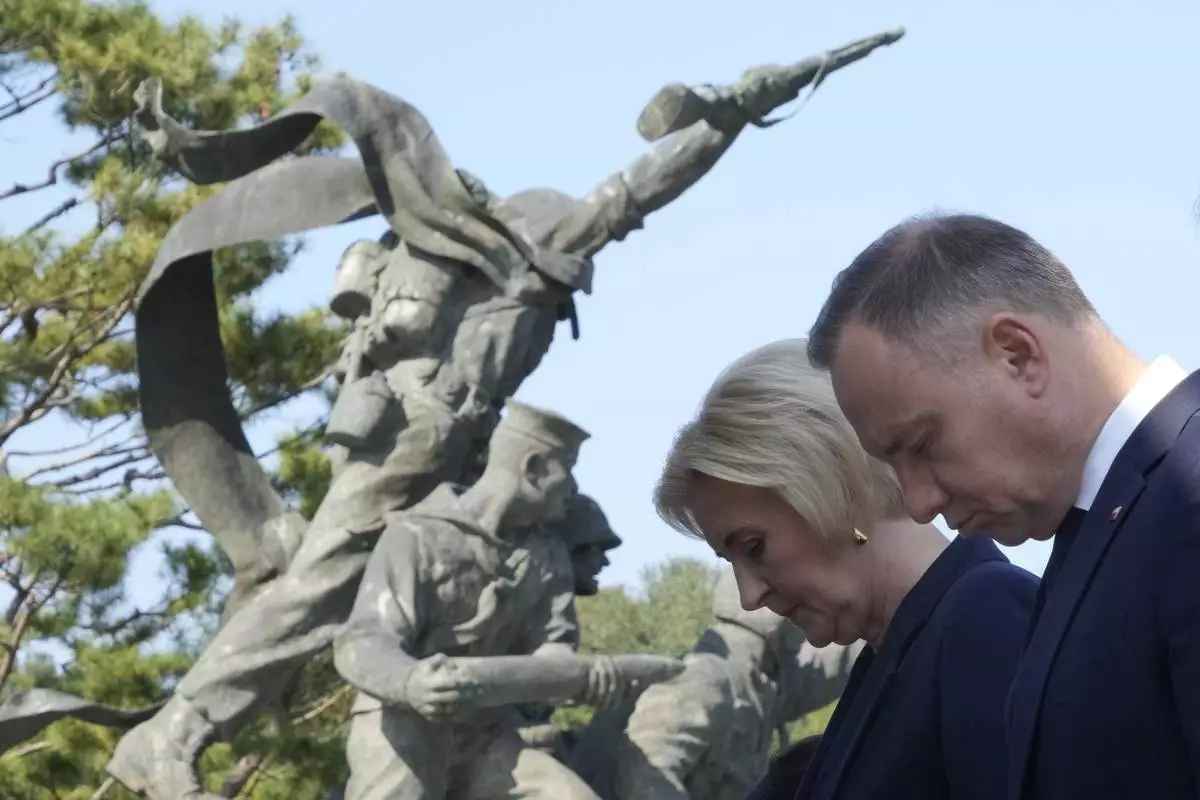
Polish President Andrzej Duda, right, and his wife Agata Kornhauser-Duda pay a silent tribute at the National Cemetery in Seoul, South Korea, Thursday, Oct. 24, 2024. (AP Photo/Ahn Young-joon)

Polish President Andrzej Duda, right, and his wife Agata Kornhauser-Duda offer a wreath at the National Cemetery in Seoul, South Korea, Thursday, Oct. 24, 2024. (AP Photo/Ahn Young-joon)
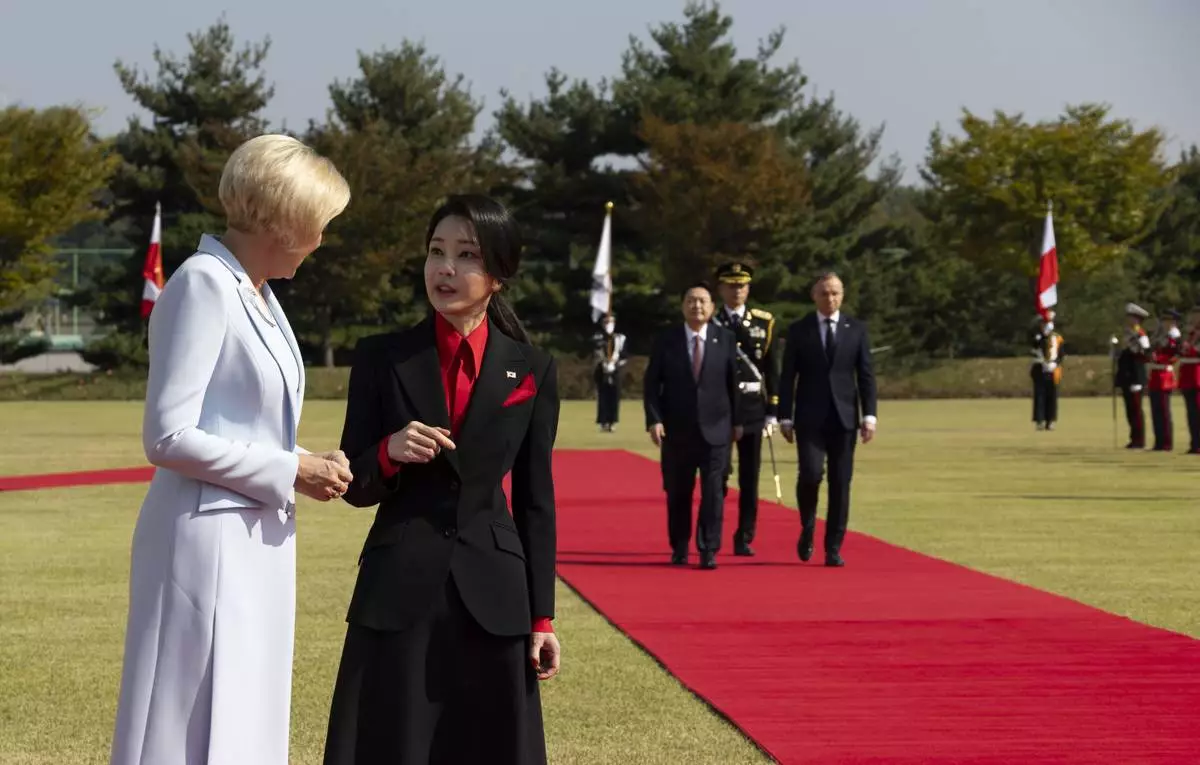
South Korean first lady Kim Keon-Hee, second from left, talks with Polish first lady Agata Kornhauser-Duda, left, as South Korea's President Yoon Suk Yeol, third from left, and Poland's President Andrzej Duda, right, walk with honor guards during a welcoming ceremony at the Presidential Office in Seoul, South Korea, Thursday, Oct. 24, 2024. (Jeon Heon-Kyun/Pool Photo via AP)
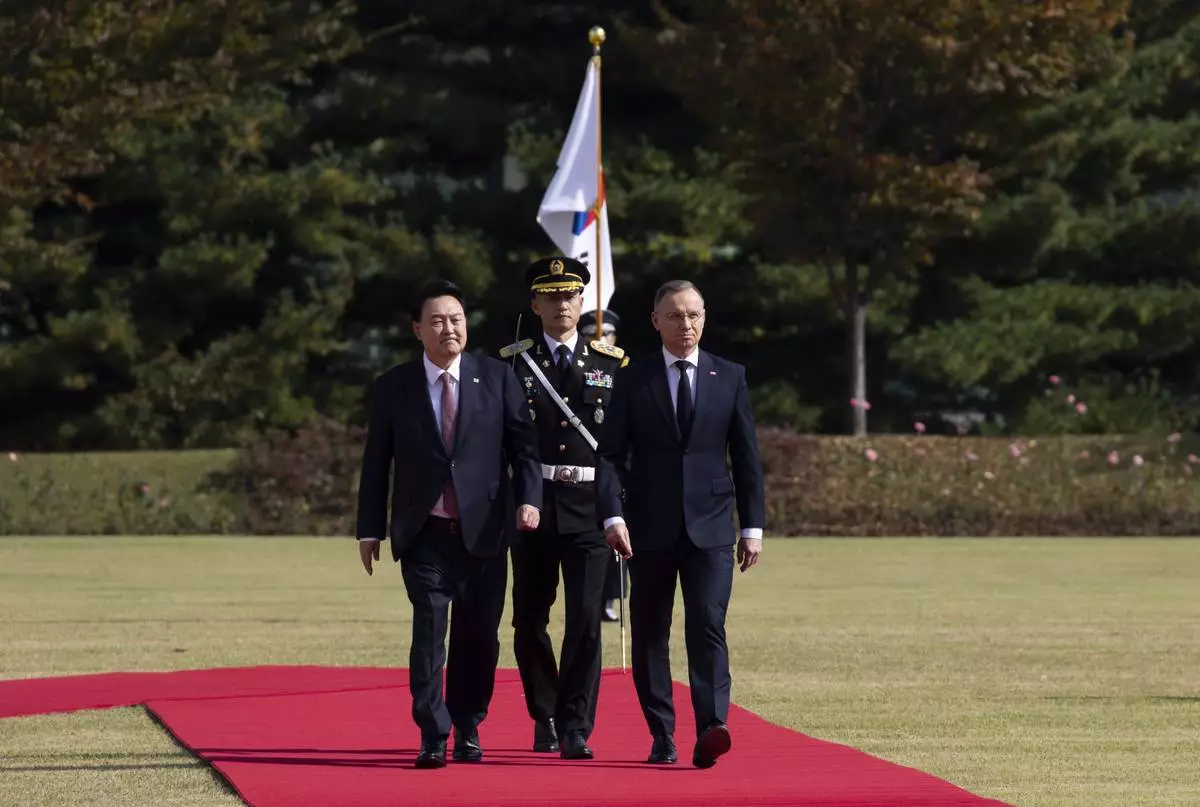
South Korean President Yoon Suk Yeol, left, and Poland's President Andrzej Duda, right, walk with honor guards during a welcoming ceremony at the Presidential Office in Seoul, South Korea, Thursday, Oct. 24, 2024. (Jeon Heon-Kyun/Pool Photo via AP)
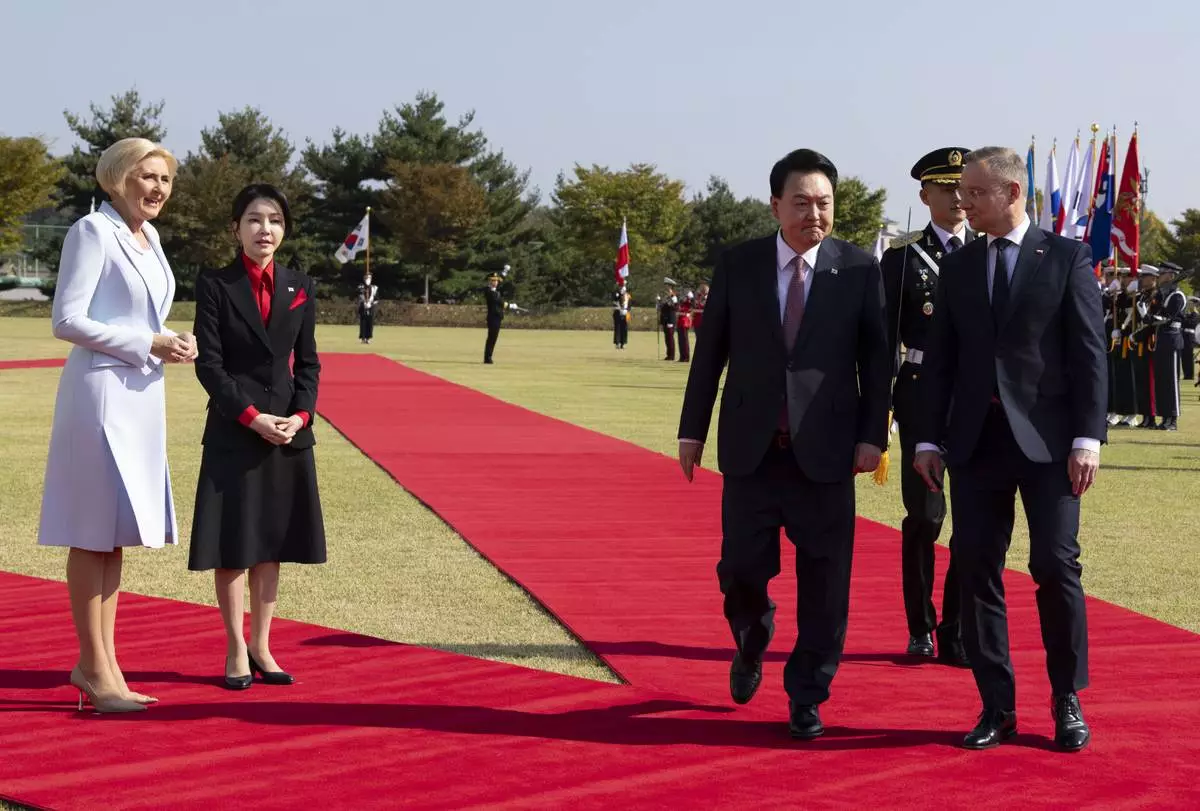
South Korean President Yoon Suk Yeol, third from right, and his wife, Kim Keon-Hee, second from left, and Polish President Andrzej Duda, right, and his wife Agata Kornhauser-Duda, left, participate in a welcoming ceremony at the Presidential Office in Seoul, Thursday, Oct. 24, 2024. (Jeon Heon-Kyun/Pool Photo via AP)
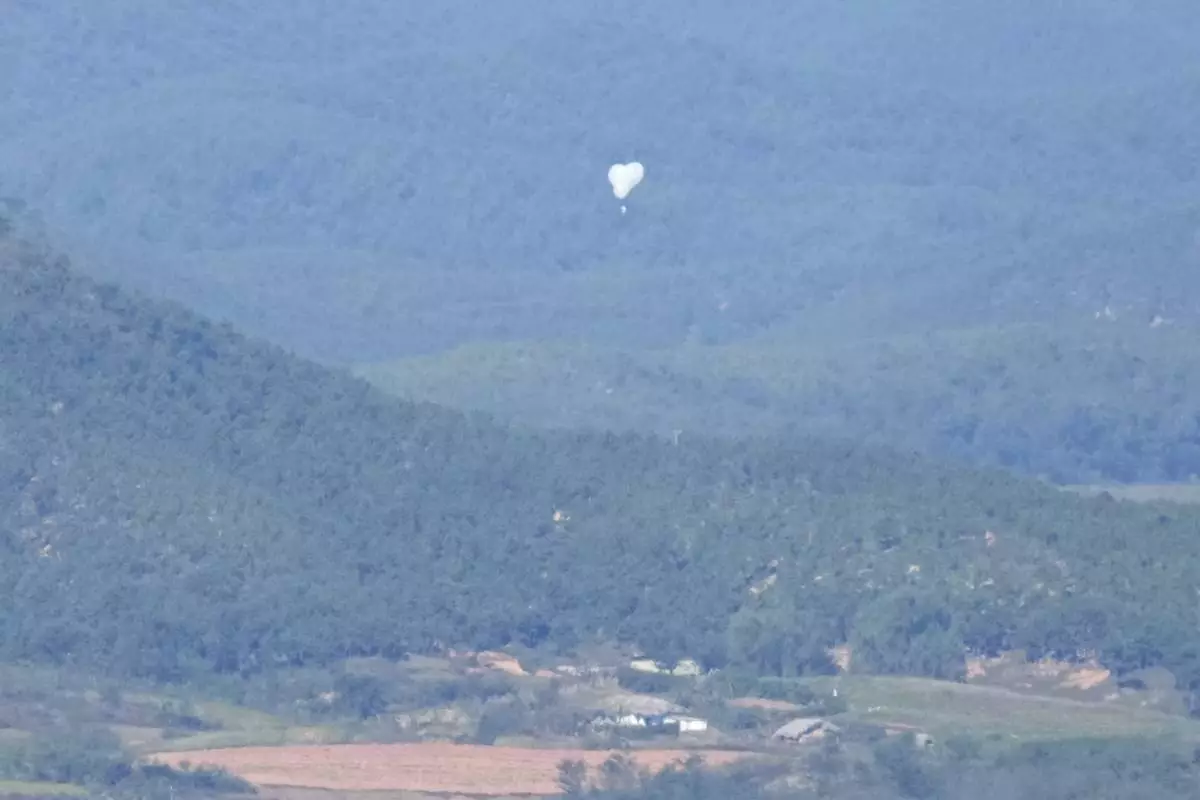
FILE - North Korean balloons are seen from the Unification Observation Post in Paju, South Korea, near the border with North Korea, on Oct. 4, 2024. (AP Photo/Lee Jin-man, File)

A visitor uses binoculars to see the North Korean side from the unification observatory in Paju, South Korea, Tuesday, Oct. 15, 2024. (AP Photo/Lee Jin-man)



